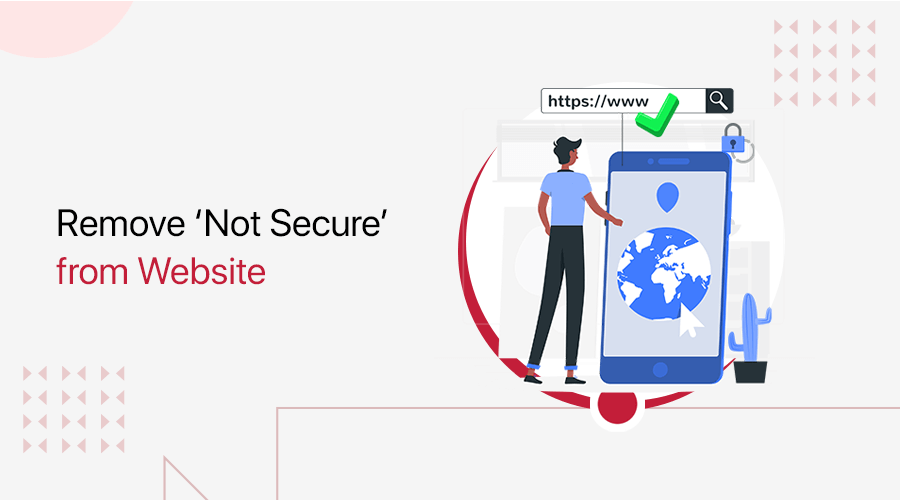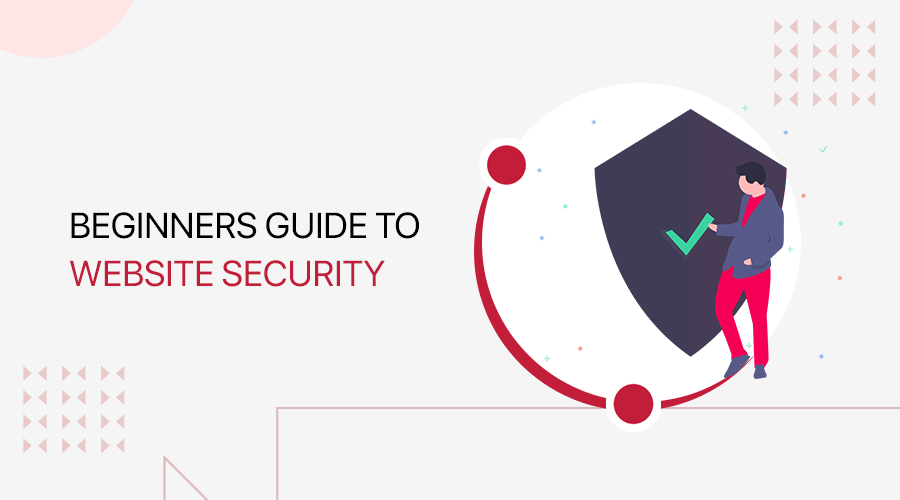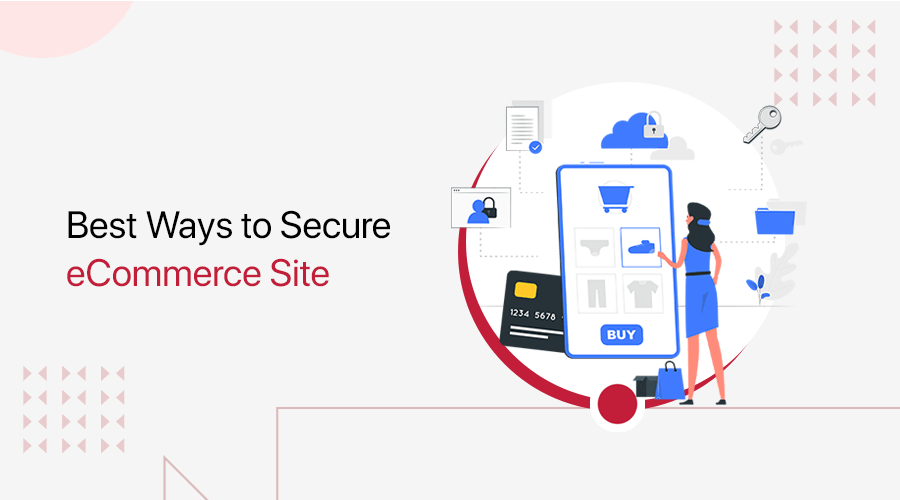
Are you worried about eCommerce security? Did you start an online business and now you’re worried about the security of your eCommerce website? If so, then you’ve come to the right place.
In recent years, the popularity of online businesses has sky-rocketed. Many businesses have started building their own eCommerce website. However, with the growing eCommerce market, the concerns over privacy and security can also increase.
Thankfully, there are many ways in which you can secure your website. The best part is that you don’t have to be an expert to implement them.
In this article, we’ll discuss some of the best ways to secure your eCommerce website. This ensures your website is safe from outside threats and avoids other damage to your business.
Let’s get started.
What is eCommerce Security? – Overview
You can keep your online shopping experiences safe and secure thanks to eCommerce security. You want to ensure that no one can steal or misuse your personal information when you shop online. That is where eCommerce security comes in.
For example, when you want to send a friend a private message that nobody else can see. In that situation, you confused the message using a secret code that only you and your friend can decipher. In a similar way, eCommerce security works too.
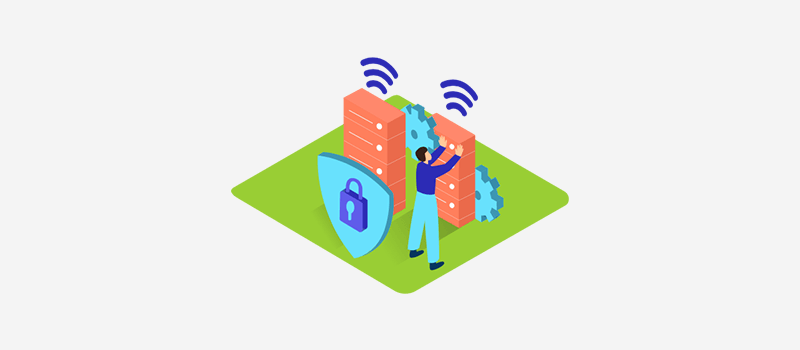
Personal information that you share while online transactions is jumbled using specialized encryption methods. As a result, even someone who tries to intercept the data won’t be able to fully understand it.
Now, only the intended recipient, like the online store owner or the payment processor, can understand and make sense of the information.
Ultimately, eCommerce security also deals with keeping all the software and systems up to date. Just like any other devices and software, eCommerce platforms also need regular updates to stay secure.
Hence, these upgrades mostly focus on fixing security flaws and breaches like hackers accessing your information without authorization.
Therefore, it’s a good idea to have the latest security measures in place when a website updates and notifies you of the upgrade.
Why Do You Need to Secure Your eCommerce Website?
eCommerce security is all about protecting against misuse of your information with regard to your online purchases. It accomplishes this by leveraging encryption to modify your data.
Therefore, it’s important to keep everything up to date and ensure that only authorized individuals can access your accounts. Together, these steps provide an environment that is risk-free and secure for you to shop online.
Therefore, here are some crucial reasons why you need to secure your eCommerce website.
i. Protecting Sensitive Customer Information
We know that eCommerce websites deal with sensitive customer data, such as personal information, credit card details, and addresses.
Hence, nobody wants that information to fall into the wrong hands. Or else, it can lead to identity theft, financial fraud, and other harmful consequences for your customers.
Therefore, by implementing security measures, you can protect your customers’ data and privacy.
ii. Building Trust and Credibility
Anytime security breaches and data leaks occur, they can seriously harm your eCommerce business’s reputation.
As a result, your customers will gradually become more hesitant about sharing personal information online. Therefore, eCommerce security will promote confidence in and build trust among your customers.
iii. Avoiding Financial Losses
As mentioned before, security threats can affect significant financial losses for your eCommerce business.
You will be subject to legal obligations, regulatory fines, lawsuits, and payment expenses when a breach occurs. Due to a bad name, this may result in a decrease in sales and revenue. Therefore, implementing security measures can significantly minimize the threat of such losses.
iv. Defends Against Hacking Attempts
eCommerce websites have undoubtedly always been easy pickings for hackers. Many hackers search for opportunities to manipulate code flaws in your website, insert malicious code, or get unauthorized access to your server.
Hence, you can increase your website’s security against these risks by implementing security measures like firewalls and intrusion detection systems.
v. Securing Website Availability
Your eCommerce business could be at risk from downtime, which would cost you money and anger customers. Genuine users may access your website due to cyberattacks such as Distributed Denial of Service (DDoS) attacks.
Thus, implementing security measures ensures a seamless shopping experience for customers and helps maintain the availability of your website.
In conclusion, protecting your eCommerce website is essential to keep your consumer data safe, establish trust, and avoid financial losses. For your online business to succeed and thrive in the long run, you must make this crucial investment.
What are Possible eCommerce Security Threats?
As we mentioned earlier, eCommerce security threats refer to various risks and vulnerabilities. It can compromise the security of online transactions and customer data in an eCommerce environment.
Thus, here are some of the possible eCommerce security threats include:
- Phishing Attacks – These involve fraudulent emails or websites that mimic legitimate ones to trick users. As a result, they end up revealing sensitive information like login credentials, credit card details, or personal information.
- Data Breaches – It means unauthorized access to a company’s customer data or sensitive information. This can lead to identity theft, financial fraud, or other malicious activities.
- Payment Card Fraud – The very common threat related to eCommerce platforms. In it, attackers may intercept card details during transmission or use stolen credit card information to make unauthorized purchases.
- Distributed Denial of Service (DDoS) Attacks – A common type of vulnerability where attacks overwhelm a website’s servers by flooding them with excessive traffic. This causes the site to slow down or become inaccessible.
- SQL Injection Attacks – SQL injection involves inserting malicious code into a website’s database queries. After that, hackers can easily gain unauthorized access or extract sensitive information from the database.
Therefore, to fight against these threats, eCommerce businesses should implement strong security measures. Such as secure website protocols, regular software updates, encryption, firewall protection, and more.
12 Best Ways to Secure Your eCommerce Website
Now that we’ve got a brief description of eCommerce security and why it’s important. Let’s look at some other best ways to secure your eCommerce website.
1. Choose a Secure eCommerce Platform
The very first step toward building an eCommerce website would be to choose a secure eCommerce platform.
There are many factors to consider while selecting a secure eCommerce platform. First and foremost, security is crucial for any online business that transfers confidential customer information like credit card numbers.

A secure eCommerce platform offers strong encryption protocols as a result. By ensuring that it gets transmitted and stored securely, that information is protected. The risk of data breaches, hacker attempts, and identity theft is reduced.
Thus, it helps to maintain the trust of your customers and safeguard the reputation of the business you run.
A secure eCommerce platform also offers protection against potential financial losses. Unsecure websites are more vulnerable to data leaks and cyberattacks. This may have a significant effect on costs related to recovering from an attack, legal liabilities, and regulatory fines.
Furthermore, a secure platform frequently uses security upgrades and patches to fix flaws. Additionally, it provides tools for preventing chargebacks and fraudulent transactions, including secure payment gateways and fraud detection systems.
In conclusion, selecting a secure eCommerce platform protects consumer data, upholds confidence, and saves your business from financial losses.
Recommendation – WordPress, Squarespace, Wix, Shopify, BigCommerce, Ecwid, and Weebly
2. Choose the Right eCommerce Hosting Provider
Choosing the right eCommerce hosting provider is robust for the success of your online business. In the beginning, an eCommerce hosting provider is essential to ensure the performance and reliability of your online store.
The infrastructure that is scalable and high-performing and can support the needs of your eCommerce website is provided by a reliable hosting company. This includes high traffic volumes, fast page load times, and seamless transaction processing.

The best hosting company ensures that your website will continue to be responsive and accessible. As a result, it’ll send a positive user experience for your customers due to the site’s excellent loading speeds.
Another important consideration when selecting an eCommerce hosting service is security. For the protection of your website and customer information, every hosting company needs to have strong security measures in place.
They must include features like firewalls, virus scanners, Secure Socket Layer (SSL) certifications, and routine backups.
A reliable host will also have dedicated teams that keep an eye out for security risks. You will receive support if there are any problems with potential cyber risks, data breaches, or unauthorized access with that.
In conclusion, choosing the best eCommerce hosting company is important for assuring the performance, reliability, and security of your online shop. You must make an investment in a reputable hosting company that offers a flawless shopping experience and protects crucial data.
Recommendations – Kinsta, Bluehost, Cloudways, SiteGround, Hostinger, DreamHost, and A2 Hosting
3. Use Strong and Unique Passwords
According to research, weak or stolen credentials were used in the majority of credential theft breaches. Make sure you, your employees, and your customers follow the proper processes for creating secure passwords. Here are some tips to create strong and unique passwords –
- Strong passwords should include upper and lowercase letters, numbers, and symbols.
- Make sure that the length of the password should have at least eight characters.
- Never share a password; each user should have their own, private username and password for login.
- Don’t use the same password or other login information for your e-commerce site and other websites.
- You can consider utilizing a password manager.
- Never disclose confidential data like your social security number, date of birth, or any other details as answers to security questions.
4. Keep Your Website Up-to-Date
Another best practice would be to keep your eCommerce website up-to-date. You never know when a security flaw on your website can be discovered and exploited by a hacker. Therefore, regular upgrades help in maintaining your website’s security.
Updates and patches are released to address any new threats or vulnerabilities as they appear. You must therefore stay updated with the latest software updates, plugins, and security measures.

In this way, you’ll be able to secure your website and customer data from possible cyberattacks and data breaches. Similarly to this, regular website upgrades always result in a win-win situation. Since it frequently provides performance enhancements, bug fixes, and new features.
In reality, updating your eCommerce website frequently gives your customers a flawless and successful shopping experience. It eventually results in improved conversion rates, happier customers, and ultimately business growth.
5. Use HTTPS Instead of HTTP
HTTPS provides security for your customers’ sensitive information HTTPS encrypts data when someone enters personal information on your website. Anyone attempting to intercept it will find it difficult to decode as a result.
Thus, by using encryption, data is kept safe during transmission and is protected from possible hackers. As a result, it protects your clients’ information, minimizing the risk of data breaches and increasing their trust in your website.
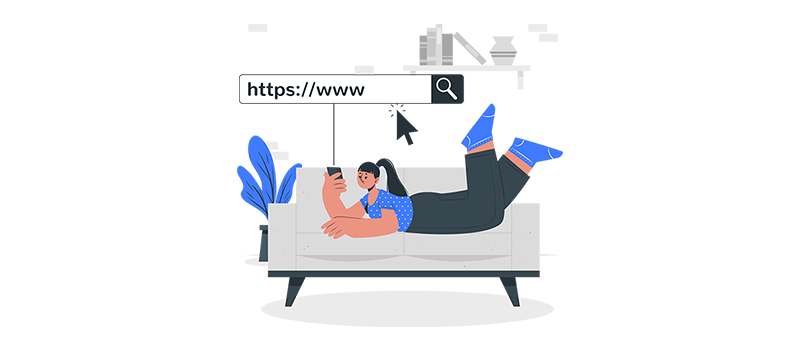
Additionally, when your website uses HTTPS, it shows a padlock icon and a “Secure” label in the address bar of the web browser. This shows that the connection is safe and encrypted.
Thus, it gives your clients peace of mind that your website is safe and that their personal information is being handled safely.
Check out our article on how to remove the “Not Secure” message from your website. Click here.
6. Enable Two-Factor Authentication (2FA)
Enabling 2FA for your eCommerce website helps in enhancing security and protect sensitive data associated with customers. Nowadays, we can see an increase in the number of online threats and data breaches. Hence, it has become essential to go beyond just username and word protection.
Users must provide an additional verification factor as part of the second tier of security (2FA). Along with their regular login information, this additional layer of protection may take the form of a unique code or biometric details.
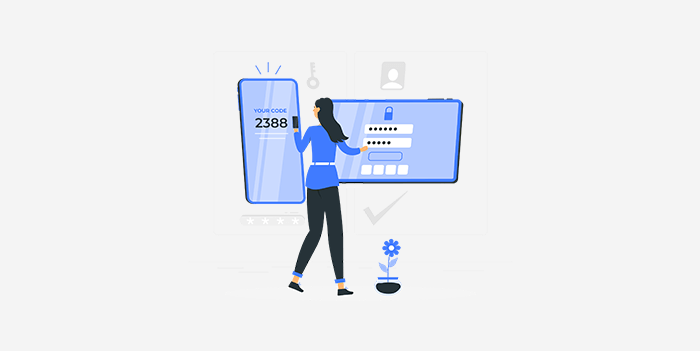
In fact, it significantly reduces the possibility of user accounts being accessed without authorization. Furthermore, even if someone were to discover your login information, they’d still require the second factor to access the platform.
Additionally, it helps you demonstrate your commitment to security and show your customers that you prioritize their protection. This can increase their loyalty and motivate them to use your eCommerce platform to make purchases.
In conclusion, enabling two-factor authentication for your eCommerce website is an essential security precaution. Also, the risk of hacking user accounts is decreased and provides an additional layer of protection against unauthorized access.
7. Keep a Backup of Your Website Data
A backup of your eCommerce website acts as a safety net in case data is lost or the website has technical issues. The loss of crucial information might be caused by server failures, hacker attempts, or accidental deletion.
These details may include customer data, order histories, and product listings. So, regularly backing up your website can make sure that you’ve got a backup of all of your important data. Indeed, it should also quickly let you restore it if necessary.
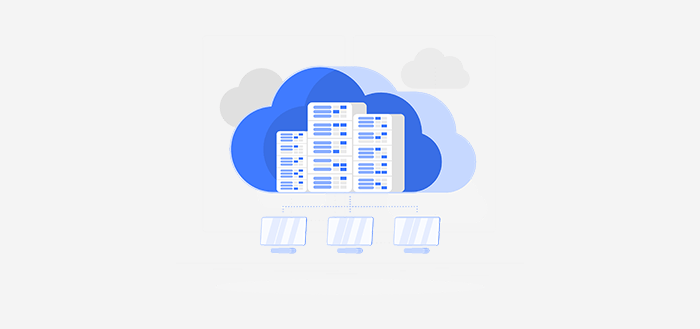
Evidently, backups provide an approach to recover from malicious attacks or cybersecurity strikes as well. Having a backup enables you to go back to a previous, unaffected version of your website.
As a result, it guarantees that you can quickly restore your eCommerce platform. Also, it reduces the impact on the business and the risk of financial and brand damage.
In conclusion, regular backups protect your eCommerce website from data loss and guarantee business continuity. Additionally, it reduces interruptions to your online business activities and offers crucial safety in the event of accidental data loss.
8. Using a Website Application Firewall
Your eCommerce website can be protected against various cyber threats with the help of a Website Application Firewall (WAF). It acts as a barrier, screening and observing incoming web traffic, between the website and potential attackers.
To identify and prevent malicious behaviors like SQL injections, you can analyze requests and put a set of rules into action. This guarantees the integrity of transactions and protects user information while preventing unwanted access to crucial customer data.
In fact, it constantly updates its rule set depending on the most recent security flaws to fight against emerging threats.
In spite of this, it provides an additional layer of security to support other security measures. Such as enhancing the overall security of the eCommerce website and using secure coding practices.
Overall, implementing a WAF helps to enhance customer trust, protect your brand reputation, and maintain a secure online shopping environment.
9. Use Content Delivery Network (CDN)
A CDN is a network of distributed servers that allocate user requests to the servers that are nearby. It’s an excellent option for a global eCommerce business.
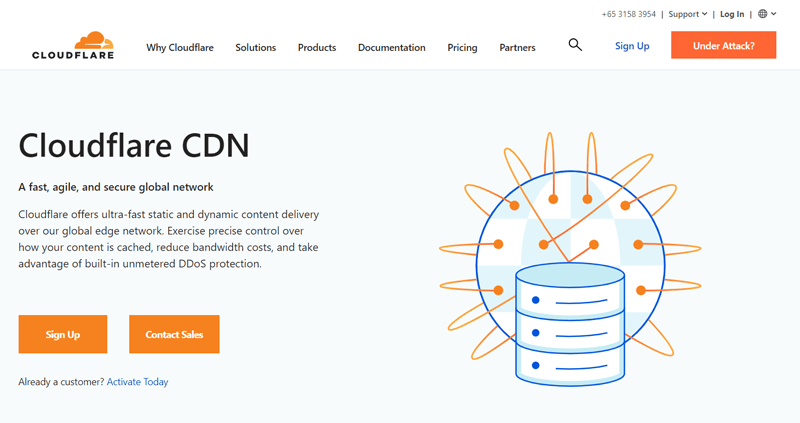
Similar to this, eCommerce websites frequently handle requests from numerous regions and experience tremendous traffic. The site can lose visitors if it takes too long to load.
As a result, you may neatly arrange the content on your website and respond more quickly. Additionally, a trustworthy CDN service like Cloudflare can assist in preventing unexpected spikes in web traffic. With capabilities like image scaling, it speeds up the page’s loading time as you’ll store a lot of media files.
Recommendations – Cloudflare, StackPath, Sucuri, and KeyCDN
10. Use Secure and Trustworthy Payment Gateways
It’s crucial to use trustworthy and secure payment gateways for your eCommerce website. It promotes trust while securing information about customers.
To protect confidential data and reduce the risk of data breaches, secure payment gateways utilize encryption and other security measures. When you integrate with a secure payment gateway, it assures your customers that their payment details are handled securely.

Additionally, using secure payment gateways compliance with industry standards such as PCI DSS. This minimizes the risk of legal repercussions while protecting the data of your customers.
In addition, reliable payment gateways provide excellent user experiences as well as dedicated support for customers. Thus, it improves consumer satisfaction and quickly resolves any payment-related problems.
We are all aware that using an eCommerce website to share or store confidential information is never a good idea. Because it can increase the threat of data infringements and unauthorized access.
All eCommerce websites handle sensitive information similar to client names, addresses, payment details, and more. The website becomes more attractive as a target for hackers when you store sensitive information on it.
Additionally, if the website’s security measures are breached, then the confidential data may become accessible to all. This will lead to identity theft, financial loss, and possible legal consequences.
Alongside that, revealing and retaining confidential data on an eCommerce website may damage your customer’s trust. Customers expect that their personal information will always be treated with the utmost care and confidentiality.
In case of a data breach or mishandling of confidential data, it can brutally damage the reputation of the business. To ensure the success of an eCommerce business, ensure that you maintain the trust of your customers.
If you don’t, then it’ll damage the business’s reputation and relationships with customers for a very long time.
12. Aware of Your Customers and Employers
Lastly, you need to educate your users on the laws and policies that affect customer data. In the same way, you have to educate both the employees and customers about your information security protocols.
Make sure you are open and honest about how you protect the customer’s credit card information. In fact, you should teach customers how to secure financial information on their end as well.
Likewise, you should highlight your organization’s best practices for data security. Also, advise them against sending confidential data via chat, text, or email.
However, you must also educate your employees on the appropriate procedures for protecting customer information. You need to plan some education and awareness-raising activities. And instruct them to stick to security guidelines and procedures to shield your company from possible legal consequences.
With that in mind, are you looking for some more effective ways to increase your website’s security? Then, check our complete beginner guide on how to secure a website for more best security practices.
Conclusion
In this article, we looked at the complete guide on eCommerce security. We hope this article provided you with some tips and tricks to secure your eCommerce website
Please feel free to comment below if you have any further queries regarding eCommerce security. We’ll do our best to respond as soon as we can.
Also, let us know which best security practices are you implementing on your eCommerce website. You can share your top tips and tricks in the comments section below.
Besides that, we’d also love to hear your thoughts on this article. So, please feel free to comment on any queries or suggestions below.
You may also want to check our guide on how to remove “Not Secure” from your website and how to update WordPress to the latest version.
Follow us on Facebook and Twitter for more articles like these. Also, if you liked this article, then share it with your friends and colleagues.
